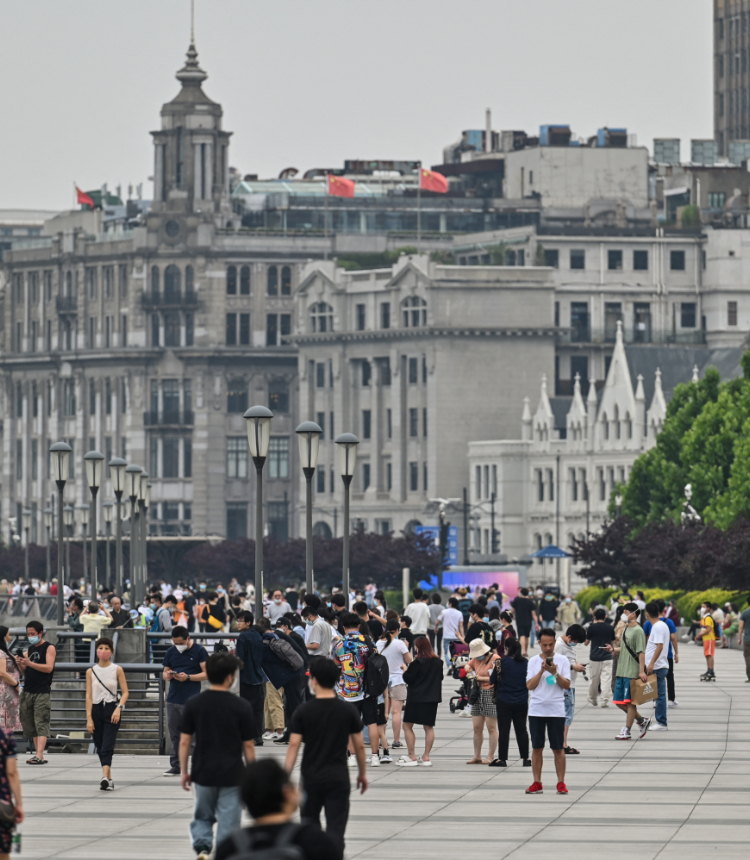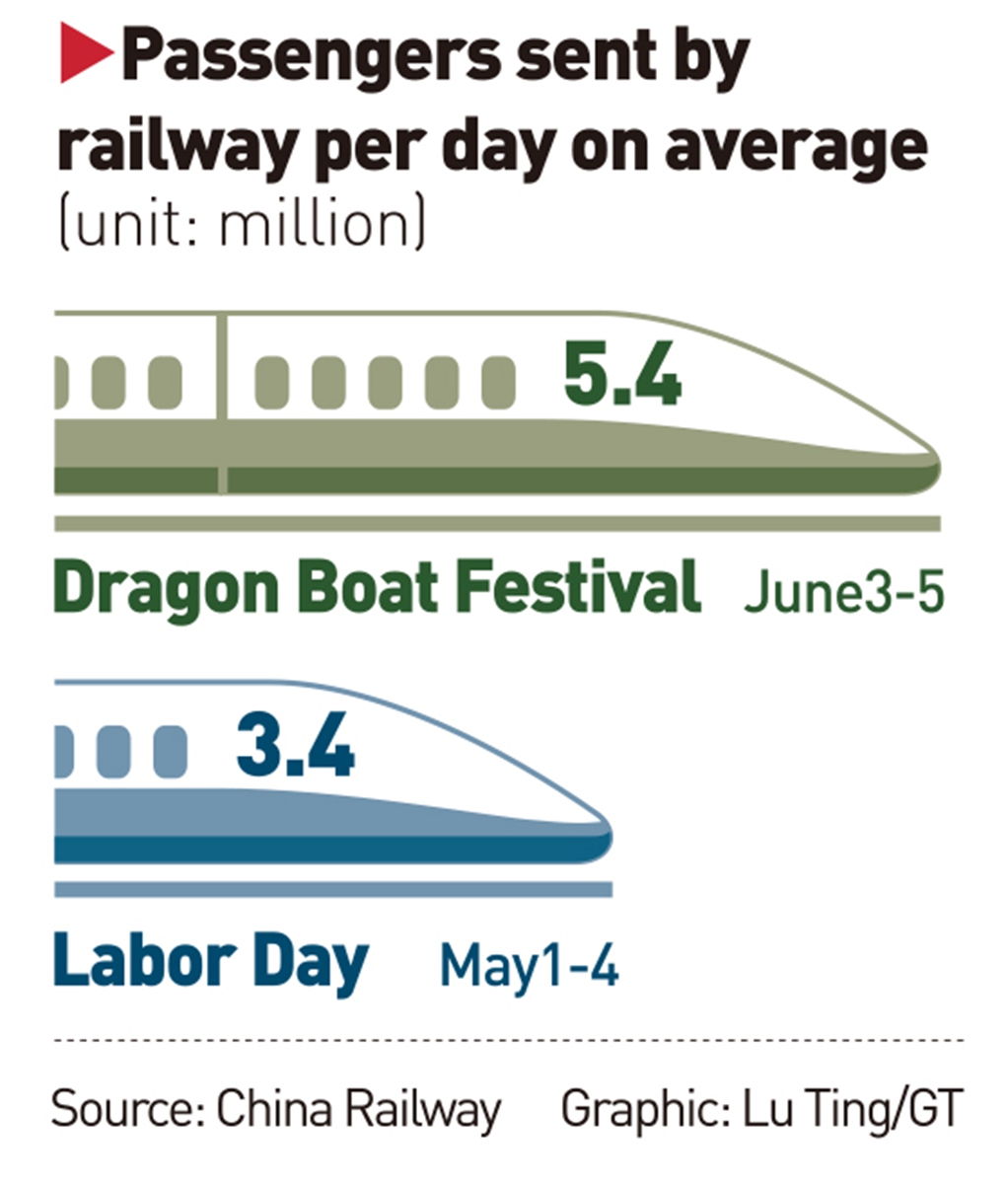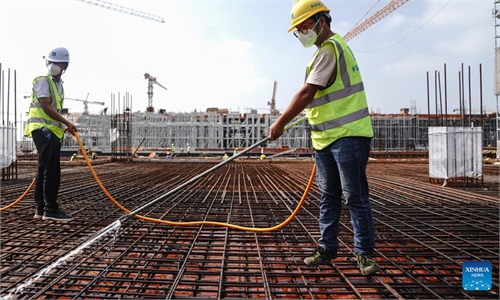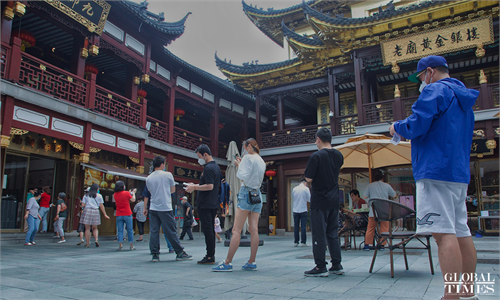Shanghai’s hustle and bustle comes back, economic activities rebound during Dragon Boat Festival holiday
National GDP growth likely to reach 3% in Q2 as activity resumes: analyst

People gather on the Bund along the Huangpu River in Shanghai on June 1, 2022, following the easing of COVID-19 restrictions in the city after a two-month lockdown. Photo: AFP

passengers sent by railway
Shanghai's hustle and bustle has come back thanks to measures to encourage people to return to stores while maintaining epidemic prevention efforts, with manufacturing, retail, tourism and other sectors witnessing a rebound during the Dragon Boat Festival holiday.
"I haven't seen so many people in the past two months," a Shanghai resident named Chen Sha told the Global Times on Sunday. Chen said bustling shopping centers and street markets in Shanghai have quickly come back, as the country's 618 (June 18) mid-year shopping festival has attracted consumers looking for bargains.
"At a Suning retail store in Changning district on Friday, TVs, ovens, fridges and other items on sale were in the most conspicuous place. Meanwhile, clothing brands such as GAP and Hotwind have been offering up to 40 percent off sales to celebrate business resumption," Chen said, with long lines also seen at some bubble tea stores.
As Shanghai is on track to fully restore the normal order of production and social life, the city's tourism industry embraced a crucial turning point during the Dragon Boat Festival holiday (from Friday to Sunday). According to data from domestic online travel agency Trip.com, more than 40 scenic spots in Shanghai have reopened since June 1, and bookings for these destinations via the platform have resumed.
A total of 40,000 tickets were sold on the platform on the first day of the three-day holiday, and the average daily number of tickets sold for the Happy Valley Shanghai amusement park surged over seven times compared with March, the data showed.
"Shanghai has made sound achievements in terms of production resumption, with the work resumption rate reaching 80 percent," Xi Junyang, a professor at the Shanghai University of Finance and Economics, told the Global Times on Sunday. He forecast that business in the city may not fully recover until the second half of June, given persisting pandemic-control measures in some areas.
To boost a fast recovery of economic and social activities, Shanghai rolled out a basket of 50 measures, ranging from encouraging work resumption and stabilizing foreign capital to stimulating consumption. As for manufacturing and business resumption, the metropolis has scrapped the "whitelist" mechanism and other restrictions on companies that want to restart.
"All of our four facilities in Shanghai had gradually resumed production before May 7. In addition, our office staff members who had been working from home will return to work on Monday," US manufacturing company 3M told the Global Times on Sunday.
A manager of a Shanghai-based medical equipment company that makes injectors and paracentetic needles said that more than 100 of the company's workers started to dwell in the factory in mid-March, and therefore its production was not affected. "With smoother shipping, we will accelerate exports in the next stage," said the manager.
According to a report by China's national broadcaster CCTV, all of Shanghai's air links have gradually recovered, with the daily cargo volume of major airlines and logistics firms returning to 80 percent of normal level.
During the Dragon Boat Festival, more than 600 cargo and mail flights cleared customs at Shanghai Pudong International Airport, with the average daily amount almost back to normal, said the report.
Despite fast restoration of normal economic and social activities in Shanghai, the abrupt outbreak of COVID-19 in the country's crucial financial and manufacturing hub since March has inevitably dragged down national economic growth.
Xi forecast that the country's GDP is likely to reach 2.5-3.0 percent in the second quarter, calling for extraordinary policies to stimulate growth.
To boost weak demand, the central government should intensify fiscal spending, for example, enlarging investment in infrastructure and handing out cash to low-income families, Xi said, noting that the country's budget deficit target could be raised to 3.5 percent of GDP from 2.8 percent.
Since the beginning of the year, China has rolled out financial support for the infrastructure sector - a stabilizer of the economy.
The State Council executive meeting on Wednesday pledged another 800 billion yuan ($119.24 billion) in credit lines to provide financial support for infrastructure projects.
Meanwhile, Chinese local governments are handing out billions of yuan in shopping vouchers and subsidies to shore up domestic consumption. In one such move, Shenzhen in South China's Guangdong Province began distributing the third batch of its 400 million yuan consumption coupons over the weekend, which could be spent on deals for the 618 shopping festival.




